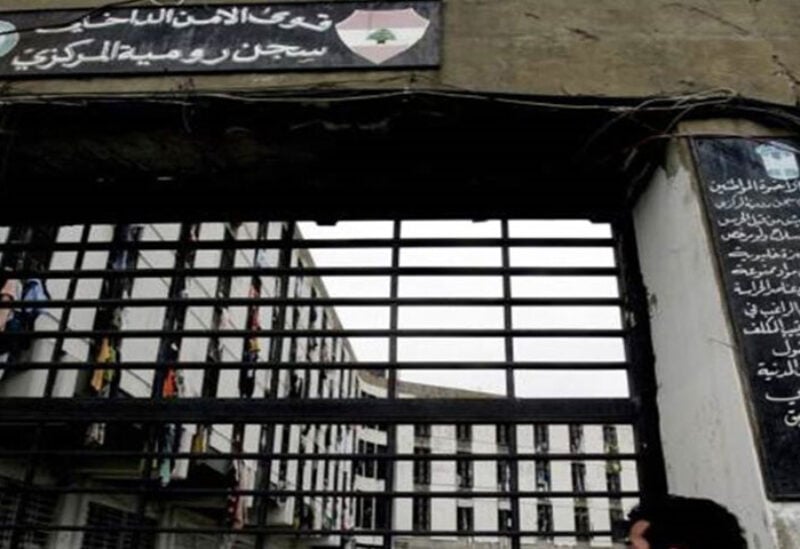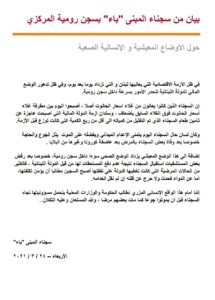
Roumieh prison
The government has failed to secure food and meat meals to the military members, and failed in securing economic stability to citizens who has lost more than 90 percent of the value of their salaries due to devaluation and the harsh collapse of the Lebanese pound against dollar. The government has also failed in maintaining stability of commodity prices in a country relying on imports.
What we have mentioned is a very small part of the difficulties facing the citizens, especially in light of coronavirus pandemic which has increased the health and economic burdens. People are fighting inside supermarkets and shops to acquire subsidized foodstuffs, but what about prisoners who are waiting for their trial?
A source familiar with what is happening inside the Lebanese jails explained to “Sawt Beirut International” about the tragic situation prisoners are experiencing mainly in Roumieh prison, who were suffering from bad conditions before this crisis.
The source added that the situation in the prison threatens of an explosion, not only in terms of living conditions, but also because of hunger, which knocked its doors.
A prisoner talks to his lawyer about the situation the prisoners are living, since the beginning of the pandemic and once a member from the security forces transmitted the virus to one of the buildings that include more than 300 prisoners. Since that incident, physicians stopped providing treatments to the infected prisoners. Some associations and individuals, at the expense of the prisoners’ families, only provide treatments.
The lawyer said that the building ‘C’ was allocated for coronavirus patients and isolated, and they were treated by giving them “Adol”. Some of the infected prisoners refused to go to that building due to negligence, lack of nutrition, and the maltreatment especially when they were calling for their rights.
Another dilemma appears in the prisons, as the risk of famine arises mainly in Roumieh, and threatens the prisoners’ lives. Before the crisis, prisoners used to buy their needs from a “store” in Roumieh prison at very high prices, but the prices have currently became unacceptable and prisoners are unable to buy their needs anymore. This situation has forced them to eat what is offered for them in the prison despite the bad quality. In addition to that, the prisoner’s families were prohibited from bringing them foodstuff.
The prisoner said to his attorney: “We are living a nightmare. Due to the austerity, we are witnessing shortage in food products which has reached almost a quarter what was provided before.” Two chicken meals were catered to prisoners per week, but we are not getting more than one meal in two months. The meat has disappeared from the menu, and the quantity of rice provided is not enough for all prisoners.
The source added that the prisoners are fed up. “We have raised our voice several times in an attempt to communicate with the concerned authorities and explain for them our miserable situation, but unfortunately we failed because they lack the ability of solving our problem.” Additionally, the prison is overcrowded with prisoners as a lot of them are waiting for their verdict. He said that half of the prisoners in one of the buildings are still awaiting for their verdict. This problem has evolved In light of the pandemic and threatening of an explosion inside the prison.
The Director of the Prison Committee of the Bar Association in Tripoli Mohamed Sablouh told “Sawt Beirut International,” that he has heard about famine in Roumieh’s prison mainly in building ‘C’ and ‘D’, were as two prisoners share one apple, and the number of meals shrank from three to two per day. Prisoners aren’t able to purchase their needs from Roumieh’s shop, and aren’t able to receive foodstuff from their families as well. Prisoners have sounded the alarm to the Parliamentary Committee as what is happening contravenes with international norms and the state must implement the Lebanese law. But some of the attendees considered that there is exaggeration in the matter, and they asked for forming a committee. They decided at the end that the President of the National Commission for Human Rights will visit the prison. However, lawyer Sablouh asked the members of the Commission to meet the prisoners and talk with them about their miserable situation.
Sawt Beirut International has received a copy of the statement issued by the prisoners from Building “B” in Roumieh which states their difficult living conditions.
